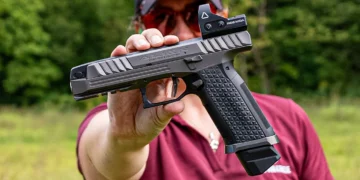
Recently, I had the chance to have lunch with American expatriate Kevin Wilkins at the Nuremburg, Germany IWA outdoor trade show. While discussing his various projects, he mentioned he had added a semi-custom chef’s knife to his line of cutlery. Naturally, I quickly cut a deal for him to loan me a sample for this column. Not long after that two versions of the same knife showed up in the mail straight from Berlin.
German-American Standards
His cooking knives are blanked from German Becut stainless, an alloy that is mostly used in industrial food-processing machines. Becut is a very fine grained, extremely tough steel that tends to deform before it will chip. Needless to say, blade chipping is a highly undesirable trait in a factory food-processing machine. All of his blades are heat treated to a hardness of Rc 58-59 for good edge retention. Once the blades are blanked and heat treated, they are ground on semi-automatic grinders made by the German company Siepmann under Wilkins’ direct supervision. As with most traditional German-made professional grade food-prep blades, the Wilkins are left a bit thicker (0.3-.04mm) at the edge than the current trendy Japanese knives. This increases the lateral strength of the edge under hard commercial kitchen use.






















